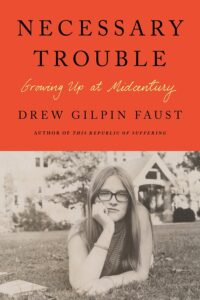“Dear Mr. Eisenhower, I am nine years old and I am white.” These were the opening words of a letter protesting racism in American public education that Catharine Drew Gilpin mailed to the president in 1957 from her family’s horse farm in Virginia — “a place,” the author would later write, “of roles and rules, of revered traditions and rigid expectations not entirely removed from slavery times.”

Drew Gilpin Faust’s riveting memoir, Necessary Trouble: Growing Up at Midcentury, opens with a photocopy of that letter, preceding even the title page. It launches the narrative just as its secret composition launched the journey of a daughter of the South’s master class. Groomed to assume the role of a Southern lady, she rejects that inheritance, becoming instead a civil-rights and antiwar activist, a distinguished historian, and the first woman president of Harvard University. Faust has owned a home in Wellfleet since 1985 and will discuss her new book at the town library on Aug. 23.
“In some ways, Necessary Trouble is about escaping Virginia, which I worked hard to do,” says Faust, adding that she never wanted to move back to her home state. Her six previous books, however, explore Southern ideology and identity in the Civil War era and its aftermath, whose resurgence in 21st-century America suggests that, in some ways, we all may be returning to the place she managed to escape.
Racial equality, women’s empowerment, educational opportunity, and receptiveness to immigrants, Faust says, have been “essential parts of my understanding of the world,” and, to the extent that they have been realized, they are “signs of a much improved world.” But now, she adds, those goals and changes are being disdained and dismantled. “We’re racing back into an era that I see as one of constraint and misery and unjust hierarchies.” One aim of her memoir is to demystify the 1950s and counter 21st-century reactionary fantasies or the era.
For Faust, growing up in the South meant suffering an early, painful, yet ultimately healthy loss of innocence. “You couldn’t hide from things that the rest of the country did a good job of hiding from,” she recalls.
By age nine, Faust was acutely aware of the racial, gender, and class hierarchies that structured her world and of the inseparability of those three systems of empowerment and subordination. One did not speak of white adult females as “women,” her mother told her. The family’s Black cook and maid were “women”; one’s friends and relations were “ladies.”
In “ladyhood,” Faust later wrote, “Southern women accepted gender subordination in exchange for continuing class and racial superiority.”
The price of ladyhood’s privilege could be punishingly high. as the first chapter of Necessary Trouble about Faust’s anorexic mother makes clear. Unhappy, often angry, and “growing thinner and thinner until the day she did not exist at all,” Catharine Mellick Gilpin nonetheless assumed as her principal obligation the socialization of her daughter to the system that suffocated her.
“I cannot help but think that my mother’s lack of education and capacity for systematic self-reflection did much to imprison her within a set of expectations that she could neither change nor realize,” Faust writes.

Education provided the vehicle for Faust’s escape. She pursued it relentlessly. In books, she first encountered the kinds of “girls who dare” — Nancy Drew, Scout Finch, Anne Frank — that she had not known among the Tidewater gentry. Armed with these models, Faust left home in 1960, three days before her 13th birthday, for a boarding school in Concord. “From that time onward,” she writes, “my parents knew and understood little of my life.”
Single-sex Concord Academy and Bryn Mawr College validated women’s intellectual ambitions and gave their students the freedom, tools, and confidence to go out into the world and fulfill them. Necessary Trouble offers affectionate portrayals of both schools, with engaging accounts of the leadership initiatives in which she honed the skills of rational refutation that she had first cultivated to counter her mother’s arguments.
One initiative was the effort to abolish Bryn Mawr’s curfew so that students need not return to their dorms from Haverford, the associated men’s college, by a certain time, or at all. As head of the Self-Government Association, Faust helped craft the students’ successful appeal to the Bryn Mawr administration — an appeal, she archly recalls, in which “a great deal of attention was devoted to the activities that women might wish to pursue in the middle of the night at Haverford apart from sexual intercourse. Curfews should not interrupt intense and extended discussions of Kierkegaard.”
Faust’s greatest enlightenment, however, may have occurred off campus. In 1963, while still at Concord, she enrolled in the East-West Travel Seminar, a program of the American Friends Service Committee that took American students “to meet with their counterparts behind the Iron Curtain to discuss foreign affairs and the means to avoid world war.” The following summer, days after slain civil-rights workers Andrew Goodman, James Chaney, and Michael Schwerner disappeared in Mississippi, Faust toured Southern states with a mixed-race student delegation that hoped “to build bridges across racial divides.” Though she would come to see these sojourns as “astonishingly naive,” they solidified her commitment to the pursuit of justice as well as knowledge and prompted the career-shaping question that Faust says she is still in the process of answering: “How did these two parts of my life relate?”
Necessary Trouble ends in 1968, the year Faust graduated from college and turned 21 — and the year that Martin Luther King Jr. and Robert Kennedy were assassinated and the carnage in Vietnam was deadliest. That year all but destroyed what her friend Kit called our “enduring but inaccurate faith in America,” Faust writes. Yet she continues: “I remained glad to have had a time when I had had a reason to believe, ideals to strive for, a glimpse of a beloved community. In the long run, it would prove sustaining because I could always hope to find it again.”
Can she find hope now? At a moment when justice and knowledge itself are assailed in ways she finds “astonishing and horrifying,” she admits that it’s not easy. Still, she says, “in spite of attacks from right and left, I believe in universities.” Scholarship has been and can be “part of a larger set of transformations,” she insists, not by serving as a compliant conduit for politics, as the left frequently wishes and the right typically fears, but by seeking to “bring us beyond the immediate, ask the big questions.”
A slender reed, perhaps. But as 18-year-old Drew Gilpin wrote in a college paper on the philosophy of Albert Camus, “To revolt, to say no, is to imply that somewhere there is a yes.” Or, as Wallace Stevens put it in a poem first published at the height of World War II: “After the final no there comes a yes/ And on that yes the future world depends.”
Rejecting Southern Ladyhood
The event: A talk by historian and author Drew Gilpin Faust
The time: Wednesday, Aug. 23, 7 p.m.
The place: Wellfleet Public Library, 55 West Main St.
The cost: Free



